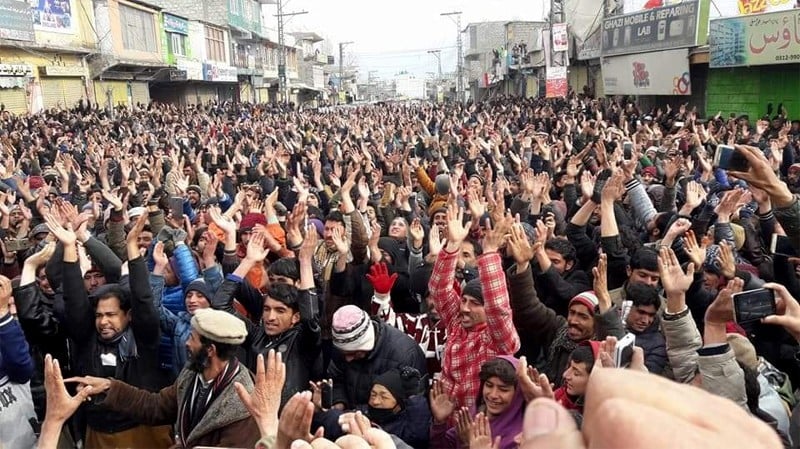
Protests in Gilgit Baltistan against imposition of taxes highlights the absence of the region’s representation in the Parliament

It was obvious the Gilgit-Baltistan government would have a hard time imposing new taxes, but the spontaneous protests by political activists, traders, transporters and commoners in all 10 districts of the region made the task even harder.
The weak regional government found itself unable to handle the seven days of protests, a shutter-down and wheel-jam strike, and a ‘long march’ from Skardu, the main city in Baltistan, to the regional capital, Gilgit. It eventually bowed down to the protestors on December 27 and agreed to withdraw the proposed taxes.
This was yet another failed attempt to impose taxes in an area where the people have become used to a tax-free culture.
This brings to mind the case of Malakand division, the Provincially Administered Tribal Areas (PATA) in Khyber Pakhtunkhwa, where the Customs Act 1969 was extended in 2016 to impose Customs duty on all items, particularly the non-Customs paid vehicles smuggled from Afghanistan. There were big protests against the move spearheaded by all the political parties and the decision had to be withdrawn.
In the case of Gilgit-Baltistan, the protestors used the issue of their region’s non-representation in the parliament of Pakistan to good effect to reject the imposition of taxes. Banners inscribed with the slogan of "Na Manzoor" (non-acceptance) of taxes were prominently displayed during the protests. One huge banner read "No Taxation without Representation" as the people of Gilgit-Baltistan have been demanding that the constitutional status of their region be defined and decided without further delay so that they could be represented in the parliament.
This popular demand has often put the government of Pakistan in a dilemma as it wants to keep Gilgit-Baltistan’s constitutional status vague due to a host of issues. It has to keep in mind the stand taken by Kashmiri politicians that Gilgit-Baltistan is part of Azad Jammu and Kashmir (AJK). Pakistan considers Jammu and Kashmir (J&K) occupied by India as a disputed territory and wants its population to decide its future through a plebiscite under the UN resolutions. India isn’t ready to give the Kashmiri people the right of self-determination as it knows they would vote against it. To sidetrack attention from the real issue, India has been claiming that Gilgit-Baltistan too is a disputed territory like AJK. In fact, this is the reason India is opposing the China-Pakistan Economic Corridor (CPEC) as it enters Pakistan from China via Gilgit-Baltistan.
However, the immediate cause for the large-scale protests was the issue of taxes. Income tax, withholding tax and other taxes were to be imposed under the Gilgit-Baltistan Adaptation Act, 2012. There were protests in the past as well but this time the protestors were determined to seek a written agreement from the regional government that it won’t impose taxes. They ended the ‘long march’ but refused to end the protests until a notification was issued for withdrawing the taxes.
Under the agreement, the Gilgit-Baltistan Adaptation Act, 2012 would be withdrawn through a notification by the Gilgit-Baltistan Council, which is the implementing body of taxes in the region. A meeting for this purpose between the Gilgit-Baltistan government and the representatives of the protestors would hold a meeting soon in Islamabad. Other terms of the agreement include amending the Gilgit-Baltistan Mineral Policy, 2016 and shifting the subject of mineral policy to the Gilgit-Baltistan Legislative Assembly, allocation of due share to Gilgit-Baltistan government from the indirect taxes collected by the federal government on the lines of the arrangements already in place in case of AJK and withdrawal of all cases registered against the leaders of the protestors. It was also agreed that the Gilgit-Baltistan Legislative Assembly may in future pass a law regarding imposition of taxes on multinational companies and organisations working in Gilgit-Baltistan.
In the end the protestors got what they wanted. They braved the extremely cold temperatures and suffered economic losses. In particular, the traders and transporters had to put up with higher losses, but they also gained a lot as the taxes would have pinched them more.
The protests attracted international attention as well and were highlighted in the world media. A headline in a newspaper declared rather dramatically and wrongly that ‘Roof of the World’ rebels against Pakistan. There was no rebellion as the protests weren’t against the state of Pakistan, but were staged to highlight certain demands and win rights.
The Indian media wishfully described the protests as anti-Pakistan as if trying to equate them with the never-ending agitation as well as armed uprising in Jammu and Kashmir. One could sense a feeling of contentment in the official circles in India as protests and trouble in Gilgit-Baltistan could have affected work on the CPEC projects. Some of the protestors did raise the issue of giving a bigger and better share from CPEC projects to Gilgit-Baltistan.
However, no separatist slogans were heard and in fact the main argument of the protestors was that Gilgit-Baltistan should be more firmly made part of Pakistan by giving it a constitutional status and through representation in the parliament. It is now up to the government to think of ways and means to fulfill this long-cherished wish of the people of Gilgit-Baltistan.
Until then, it cannot hope to impose taxes in a region that has been crying for attention and understanding. The people of Gilgit-Baltistan had willingly joined Pakistan at the time of independence by taking up arms and expelling the forces of the Dogra ruler of Jammu and Kashmir.